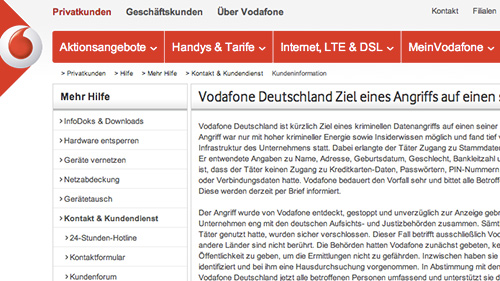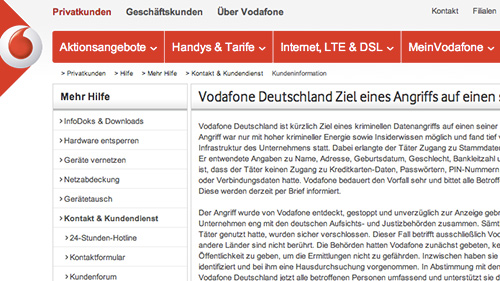
Vodafone Hacked - Customer Bank Account Details Stolen
Vodafone in Germany have admitted suffering a hacking breach in which 2 million of its customers' details were stolen. The sensitive information included customer name, address, date of birth, gender, bank sort code and bank account number.
This is the latest high-profile hacking incident to hit the headlines, while every day businesses of all shapes and sizes suffer similar breaches, much to their reputational and financial cost.
Significantly, the Federal Trade Commission recently sued Wyndham Hotels after their weak password policies resulted in customer information being stolen. The FTC accused Wyndham of using unfair and deceptive practices when the company told its users that they had used "standard industry practices" to protect their private information, when in fact the steps it had taken were not deemed to be either reasonable or appropriate in the FTC's eyes.
Verizon's 2013 Data Breach Investigations Report found that 40% of security breaches were from guessing, cracking or re-using credentials and 25% of breaches were caused by phishing. Remember that my1login protects businesses against all of these forms of attack.
Advice for Hacked Vodafone Customers
Vodafone customers should now prepare themselves to be targeted by phishing campaigns designed to trick them into unknowingly handing over their Vodafone account login credentials. If you are a Vodafone Germany customer, or a customer of any other company which has suffered a similar breach, it's important to be vigilant against the threat of follow-up phishing scams.
Don't provide any account information if you're phoned by someone purporting to be from Vodafone who asks you to verify your details following the incident, and don't click any links in emails which may appear to be from Vodafone, but ask you to log in and verify your credentials. Scammers capatalize on hacking incidents such as this breach of Vodafone and use it to target worried customers and steal further personal information. Be vigilant and be sure to check out our guides on phishing and how to avoid being caught out.
my1login - Protecting Passwords in the Cloud Since 2007.
Further Reading
Related Articles
How To Test Single Sign On
Single Sign-On (SSO) is a critical component of enterprise security and user experience, allowing users to authenticate once and access multiple applications...My1Login Wins Best Identity Management Solution 2022
My1Login wins Best Identity Management Solution at the SC Awards Europe 2022!Identity and Access Management for Web, Mobile and Windows Desktop Applications
Identity and Access Management for Web, Mobile and Windows Desktop Applications










-
© My1Login 2007 - 2025
- Terms & Conditions
- Anti-Slavery Policy
- Back to the top ↑

